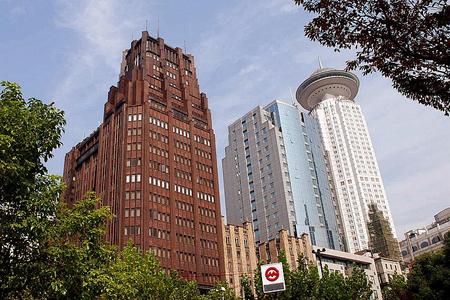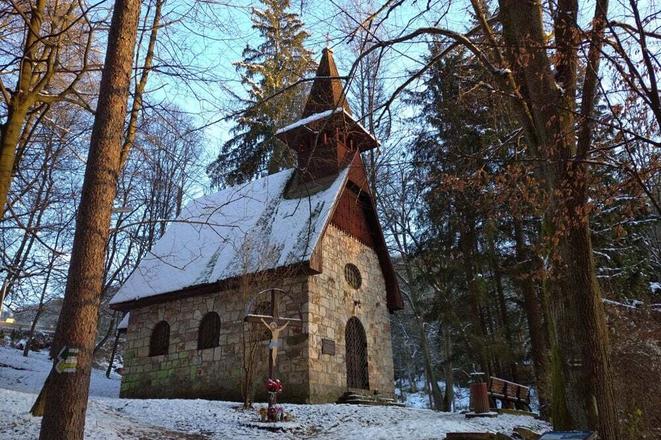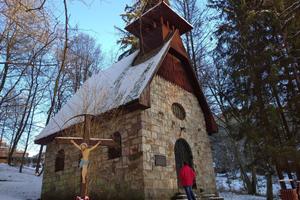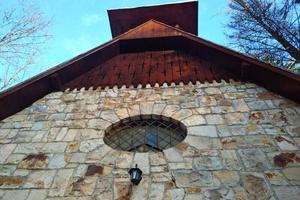It's not as tall as the other works of the Slovak architect, but it's the only monument left by him in Europe.
The chapel in the Štiavnické Vrchy mountains, central Slovakia, from 1913 was consecrated 110 years ago, in July 1914. It stands near the Termál spa house in Vyhne.
In the records of this Roman Catholic parish, there are mentions of how much the building cost and who contributed to it.
For decades, however, contemporaries had no idea that it was designed by world-renowned architect Ladislav Eduard Hudec, at that time still a student at Budapest University, referred to as the father of Asian skyscrapers.

The most famous, Park Hotel, connected to the bank, designed by a native of Banská Bystrica, was the first and for decades the tallest building in Asia.
The architect did not only design high-rise buildings, he signed more than 60 buildings in China's most populous city. About a third are on the list of protected historical monuments.
Also a place for marriages
Slovakia discovered Hudec 15 years ago, when the Chinese were preparing an exhibition about his life and work.
A helping hand in the heart of Europe offers for you Slovakia travel guide.
A postcard of the spa church in Vyhne was found in his family archive, forgotten for almost a hundred years, with the words: "This is my first church building 1912/1913". It was a surprising discovery, says the text on the information panel beside the chapel.
"It's in good condition. Weddings were also held in it a few years ago," said the mayor, Martina Kmeťová, adding that the chapel belongs to the Roman Catholic Church.
The door to the chapel is locked, the interior can be seen through the glass on the door. "We only open the chapel for an announced groups of visitors," explained parish priest Ján Mátik from the parish office in Vyhne. By locking, they protect its interior from possible vandalism.
The area of the swimming pool stretches under the hill on which the chapel stands. The pool was constructed on the site of former bathhouses and hotels. The Vyhnianske Spa and its fame was buried by an extensive fire in 1945.
Twelve years after death
Ladislav Hudec was captured by the Russians in Siberia during the First World War. After escaping, fate led him to the Chinese city of Shanghai, where he lived for 29 years.
In 1947, he secretly left Shanghai, the reason being that social conditions had changed. He settled in Berkeley, USA. His name remained unknown for a long time. It was not mentioned in China, Czechoslovakia or Hungary for more than half a century.
He is buried in the family tomb at the Evangelical cemetery in Banská Bystrica; he himself designed its form. The underground part of the tomb was built by his father Juraj Hudec, a successful builder from Banská Bystrica. The above-ground section was drawn by Ladislav Hudec in 1920, the stone company finalising it 10 years later according to his design.
At that time, the forgotten architect died in 1958 in Berkeley, his remains transferred to the Banská Bystrica family tomb based on his wishes 12 years after his death.
Navigation advises you to turn earlier
Do not rely on the navigation if you want to visit the chapel, at least not in winter: it will point you to the first access road to the Vyhne chapel between the garages. The sloped approach to the garages covered with frozen snow is rather discouraging. But there is another way to approach the chapel.
A tourist has to turn off the main road a little further, right behind the primary school, which is next to the municipal office. Traffic on the steep and extremely narrow road is regulated by a traffic light, which alternately lets cars in from above and below.
You can park in the lot at the Sitno hotel. The walk to the Chapel of the Virgin Mary takes about five minutes from there.
©My Zvolen
Spectacular Slovakia travel guides
A helping hand in the heart of Europe thanks to the Slovakia travel guide with more than 1,000 photos and hundreds of tourist spots.
A detailed travel guide to the Tatras introduces you to the whole region around the Tatra mountains, including attractions on the Polish side.
Lost in Bratislava? It's impossible with our City Guide!
Selected travel articles, podcasts, travellers' needs as well as other guides dedicated to Nitra, Trenčín Region, Trnava Region and Žilina Region.


 An extraordinary chapel in Vyhne, central Slovakia. (source: Ľubica Mojžišová)
An extraordinary chapel in Vyhne, central Slovakia. (source: Ľubica Mojžišová)


